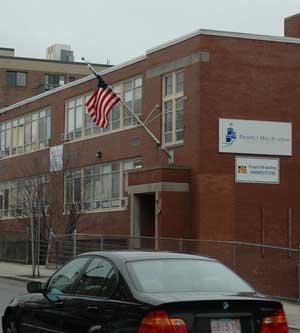By James Reddick Last Wednesday, Dec. 9, in the Aldermanic Chambers, State Representatives Denise Provost and Carl Sciortino, along with Jackie Lawrence, President of the Somerville Teachers Association, hosted a discussion on the Education Reform Act of 2009. Having passed the Senate on Nov. 17, the legislation is slated to be up for a vote in the House immediately following the Christmas recess. The Reform Act is not as all-encompassing as the name suggests. It targets those districts where schools are deemed to be failing and increases the allowances for charter schools and extends the authority of school district superintendents to intervene in "under-performing" schools. Somerville Public Schools Superintendent Tony Pierantozzi expressed his concern for the possible consequences of the legislation. "It furthers what is already an unfair advantage for charter schools and it creates a draconian element of authority over teachers in certain schools," he said. In one controversial element of the bill, should a school be deemed to be a Level Four under-performing school – a designation determined by MCAS results – the Superintendent is given the right to either renegotiate the union contracts or he/she is granted the right to force all employees of the school to reapply for their jobs. Not surprisingly, STA representative Jackie Lawrence expressed an opposition to such a measure. "This super-control could make it very hard for a low-performing school to hire new staff members," she said. Currently, Somerville does not have any schools that would be affected by the measures, but it is not guaranteed to remain in good standing in the future. The bottom 20% of schools in the state qualify for this dubious classification, but only 5% of the state's schools may be deemed under-performing at any given time. One of the central topics of discussion at the public forum was charter schools, as the bill supports them as viable alternatives within struggling school districts. It will remove caps on the statewide population that may be enrolled in charter schools and on the total number of charters allowed in the state. Furthermore, for those districts performing in the bottom 10%, which include Boston, Lawrence and Worcester, their net school spending percentage cap would increase to 18% percent over time. "We're not the worst situated community," Provost said, "but it's hard enough to sustain a parallel school system in a boom economy, let alone right now." Currently, Prospect Hill Academy is the only charter school in the city. Another provision of the bill that was met with general support, despite criticism that it may be too watered down and slow moving to actually effect change, is the creation of Innovation Schools. According to the bill, any school, with the approval of its faculty, may adopt an innovation plan that gives them wider authority to implement new educational tactics. Though in theory he supports such flexibility, Superintendent Pierantozzi questioned the means with which his schools might go about being truly innovative. "There are no resources in this bill," he lamented. With little time to go over the bill before a vote, Provost expects it to pass, though she pledged her opposition. Part of the motivation for its passage, the Representatives speculated, was the forthcoming Race To The Top funding allocation – an approximately $250 million pot that could be distributed throughout the state should it be deemed eligible. The approach to targeting struggling schools that the Education Reform Act endorses could put Massachusetts in better standing to receive this merit-based grant. "Whenever you have a race there are winners and losers," Provost said. "The motivation is to position Massachusetts to win this race, but this is temporary, one time money that is not guaranteed by this legislation." |
||||
















Reader Comments